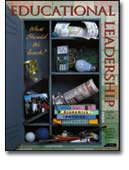As part of our ongoing effort to make Educational Leadership more relevant and interesting for educators, we ask you to tell us what you think about the topic, the articles, and the overall quality of each issue.
The survey results only reflect the opinions of readers who choose to participate. But the results from our May survey do provide us with helpful feedback and a glimpse into the minds of EL readers.
Staying on Top
Overall, readers liked the theme of our May issue, "Who Is Teaching Our Children?" Three-quarters of readers were very interested in the topic; only 5 percent of readers were not interested in the topic. One reader wrote, "An excellent choice of articles that represented all the different views." Another wrote, "I enjoy reading articles that feature such well-known people in education as David Berliner and Linda Darling-Hammond."
Indeed, the interview with David Berliner by EL Editor in Chief Marge Scherer was most often cited as the most useful article in the May issue. As one respondent wrote, the Berliner interview "hit the nail on the head." Other respondents enjoyed reading reflections from their peers in "Who's in Our Classrooms," a collection of essays from educators. "The teachers' comments were motivational and uplifting," wrote one reader.
Among the EL columns, Research Link by John Holloway continues to be cited as the most interesting, with Web Wonders and Perspectives tying for second.
Diversity and Debate
Proving that EL readers are a diverse group, 15 articles were cited as most useful. And reader response to the articles was mixed. In particular, the articles on alternative certification provoked some debate.
Whereas some readers cheered the alternative routes to teaching, others argued that these shortcuts weren't preparing teachers for the rigors of the classroom. One respondent wrote,If teaching is to be valued as a profession, no shortcuts should be taken. There is only one way to become a teacher—through hard work, dedication, extensive coursework at the college level, and field-related experience.Another reader countered, "I am teaching because of an alternative certification program. My students do as well as those with 'regular' certified teachers."
Looking Ahead
Readers, in general, did agree on one thing: They want more on this topic. In particular, respondents wanted more information on mentoring, the transition from college to classroom, and professional development for teachers at all levels. Look for more on these topics in our March 2002 issue on "Redesigning Professional Development."
Your Turn
Do you agree with these survey results? Let us know what you think about this issue by completing this month's Your Turn survey on page 90 of this issue or online at www.ascd.org/elsurvey.html.
Your Turn
Have you had a professional development experience that dramatically improved your attitude and performance? In about 200 words, describe what characterizes a good professional development program. We want to know what teachers, administrators, and other educators see as strong professional development and why. We will publish some of your responses in our March issue on "Reinventing Professional Development."
Please include your name, job title, school or school district, and address and phone number. Fax your response to Educational Leadership at 703-575-5897 or e-mail it to el@ascd.org. The deadline is Nov. 15, 2001. We look forward to hearing from you.
